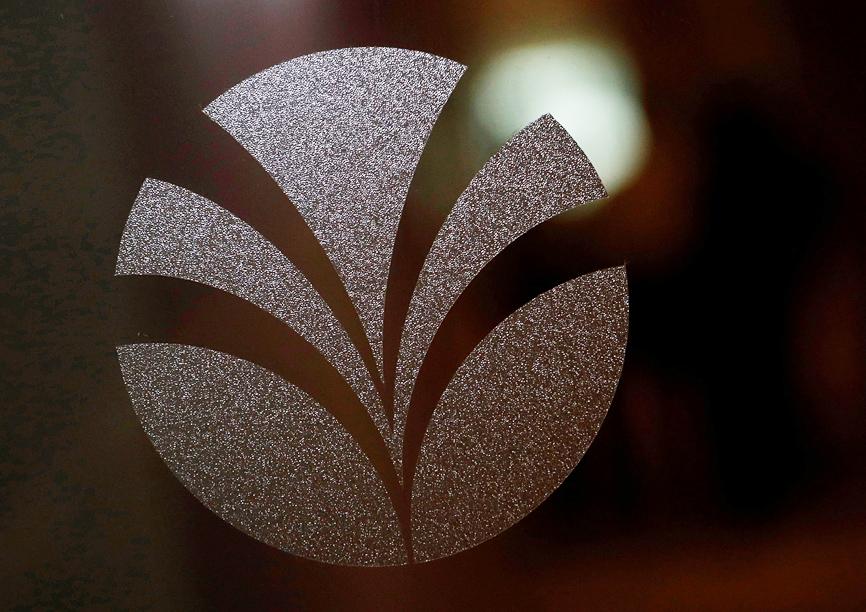Olam International Ltd, one of Asia’s biggest agricultural commodity traders and suppliers, has a target for its food ingredients unit to become part of the FTSE 100 after its initial public offering (IPO) in London.
The company, a major supplier of cocoa beans and products, green coffee and spices, expects the IPO to be “one of the bigger listings” on the London Stock Exchange (LSE) in several years, CEO Sunny Verghese said in an interview yesterday.
While the exact size is yet to be determined, Olam sees the unit potentially making it to the FTSE 100 share index, which consists of 100 London-listed companies with the highest market capitalization, Verghese said.

Photo: Reuters
Olam yesterday announced plans for a primary listing of its food ingredients business in London, while preparing for a concurrent secondary listing in Singapore, it said in a statement. The company also set a timeline to sell shares of another unit in an IPO as early as the second half of next year.
The moves follow a major overhaul of operations announced last year, which divided the Singapore-based group’s portfolio into two segments. One is Olam Food Ingredients (OFI), which consists of cocoa, coffee, edible nuts, spices and dairy, and offers products catering to the growing demand for healthier food.
The other is Olam Global Agri, which supplies food, feed and fiber with a focus on emerging markets in Asia and Africa. It includes the grains, animal feed, edible oils, rice, cotton and commodity financial services businesses.
“The primary listing on the LSE will give us access to London’s large and diverse investor base, with its deep and liquid capital markets, and enable us to benefit from its strong understanding of and research coverage across the food and beverage sector,” OFI chief executive officer A. Shekhar said. “The concurrent listing in Singapore will also enable us to retain our strong local shareholder base and further tap into growing investor appetite in Asia.”
The share sale is part of a strategic review published in January 2019, which aims to unlock and maximize long-term value. OFI purchased California-based spice manufacturer Olde Thompson for about US$950 million earlier this year. Olam announced a S$601.7 million (US$443 million) rights issue in June to cover partial repayment of a loan used to purchase Olde Thompson.
Olam yesterday also posted first-half earnings, showing that net profit rose 27 percent from a year earlier to S$421.5 million. Singaporean state investor Temasek Holdings Pte owns about 53 percent of the company, while Japanese trading house Mitsubishi Corp holds 15 percent following the rights issue.
Verghese said shareholders are supportive of Olam’s reorganization and would all stay on as investors.
The company plans to increase headcount given the need to duplicate some key functions across separate operating entities following the restructuring, he said.
Olam’s shares climbed as much as 4.2 percent in Singapore after the announcements, the biggest intraday gain since May. This compares with a 0.7 percent drop in the benchmark Straits Times Index. Still, the stock is little changed this year, even as agricultural commodity prices rallied.

BYPASSING CHINA TARIFFS: In the first five months of this year, Foxconn sent US$4.4bn of iPhones to the US from India, compared with US$3.7bn in the whole of last year Nearly all the iPhones exported by Foxconn Technology Group (富士康科技集團) from India went to the US between March and last month, customs data showed, far above last year’s average of 50 percent and a clear sign of Apple Inc’s efforts to bypass high US tariffs imposed on China. The numbers, being reported by Reuters for the first time, show that Apple has realigned its India exports to almost exclusively serve the US market, when previously the devices were more widely distributed to nations including the Netherlands and the Czech Republic. During March to last month, Foxconn, known as Hon Hai Precision Industry

Taiwan Semiconductor Manufacturing Co (TSMC, 台積電) and the University of Tokyo (UTokyo) yesterday announced the launch of the TSMC-UTokyo Lab to promote advanced semiconductor research, education and talent development. The lab is TSMC’s first laboratory collaboration with a university outside Taiwan, the company said in a statement. The lab would leverage “the extensive knowledge, experience, and creativity” of both institutions, the company said. It is located in the Asano Section of UTokyo’s Hongo, Tokyo, campus and would be managed by UTokyo faculty, guided by directors from UTokyo and TSMC, the company said. TSMC began working with UTokyo in 2019, resulting in 21 research projects,

Taiwan’s property market is entering a freeze, with mortgage activity across the nation’s six largest cities plummeting in the first quarter, H&B Realty Co (住商不動產) said yesterday, citing mounting pressure on housing demand amid tighter lending rules and regulatory curbs. Mortgage applications in Taipei, New Taipei City, Taoyuan, Taichung, Tainan and Kaohsiung totaled 28,078 from January to March, a sharp 36.3 percent decline from 44,082 in the same period last year, the nation’s largest real-estate brokerage by franchise said, citing data from the Joint Credit Information Center (JCIC, 聯徵中心). “The simultaneous decline across all six cities reflects just how drastically the market

Ashton Hall’s morning routine involves dunking his head in iced Saratoga Spring Water. For the company that sells the bottled water — Hall’s brand of choice for drinking, brushing his teeth and submerging himself — that is fantastic news. “We’re so thankful to this incredible fitness influencer called Ashton Hall,” Saratoga owner Primo Brands Corp’s CEO Robbert Rietbroek said on an earnings call after Hall’s morning routine video went viral. “He really helped put our brand on the map.” Primo Brands, which was not affiliated with Hall when he made his video, is among the increasing number of companies benefiting from influencer